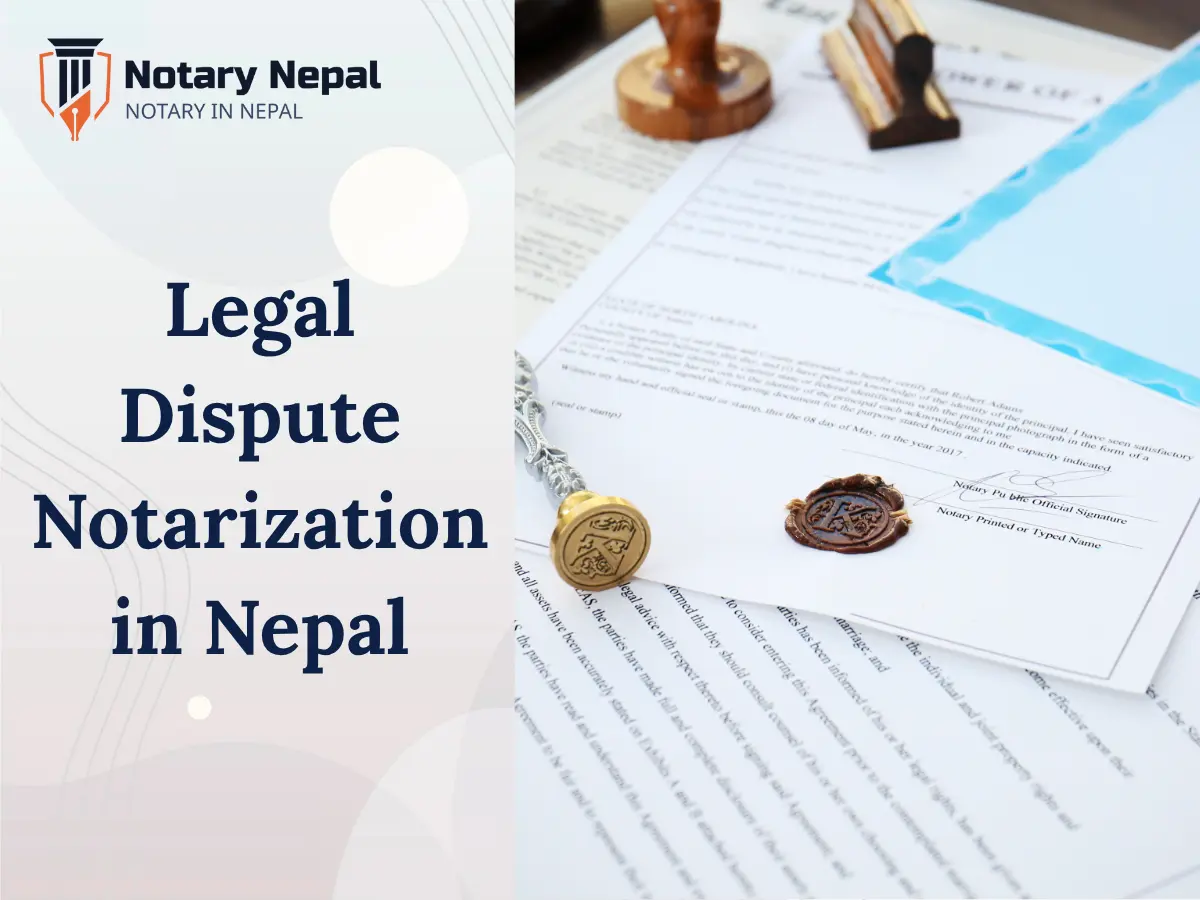

Table of Contents
Introduction
In Nepal, notarization serves as a critical process in the legal system, ensuring the authenticity and legal validity of documents used in various legal disputes. Whether dealing with property disagreements, contractual issues, or court proceedings, notarized documents provide a layer of trust and legal recognition essential for dispute resolution. This guide delves into the intricacies of legal dispute notarization in Nepal, outlining the processes, types of documents involved, and the legal framework governing these practices.
Understanding Notarization in the Context of Legal Disputes
Notarization is the official process by which a notary public verifies the authenticity of documents and the identities of the signatories. In legal disputes, this process is pivotal as it lends credibility to documents presented in courts or other legal forums. The Notary Public Act, 2063 governs the operations of notaries in Nepal, ensuring standardized practices across the country.
Key Documents Requiring Notarization in Legal Disputes
Several documents are commonly notarized in the context of legal disputes in Nepal:
- Affidavits: Sworn statements used as evidence in court proceedings.
- Power of Attorney (POA): Documents authorizing individuals to act on behalf of others in legal matters.
- Contracts and Agreements: Legal documents outlining the terms between parties, often central in disputes.
- Court Documents: Including summons, legal notices, and judgments.
- Property Deeds: Documents related to ownership and transfer of property, often contested in disputes.
The Notarization Process in Nepal
The process of notarizing documents in Nepal involves several key steps:
- Preparation of Documents: Ensure all documents are complete and ready for notarization.
- Identification Verification: Present valid identification, such as a citizenship certificate or passport.
- Visit to a Notary Public: Approach a licensed notary public authorized by the Nepal Notary Public Council.
- Document Review: The notary reviews the documents for completeness and legality.
- Signing in Presence: Sign the documents in the presence of the notary.
- Notarization: The notary affixes their seal and signature, officially notarizing the documents.
It's important to note that documents must be signed in the presence of the notary to be valid.
Affidavit Notarization
Affidavits are critical in legal disputes, serving as sworn statements that can substantiate claims in court. In Nepal, affidavits must be signed in the presence of a notary public, who then certifies the document. This process ensures the affidavit's admissibility in legal proceedings.
Power of Attorney (POA) Notarization
A Power of Attorney allows an individual to authorize another person to act on their behalf in legal matters. Notarizing a POA is essential to confirm its authenticity and the grantor's consent. This is particularly important in disputes where representation is required, such as property or business conflicts.
Contract and Agreement Notarization
Contracts and agreements form the basis of many legal disputes. Notarizing these documents adds a layer of legal validity, ensuring that the terms are recognized and enforceable in court. This process involves the notary verifying the identities of the parties and witnessing the signing of the agreement.
Court Document Notarization
Court documents, including summons, legal notices, and judgments, often require notarization to confirm their authenticity. Notarized court documents are essential in legal disputes, as they serve as official records recognized by the judiciary. The notarization process involves the notary verifying the document's origin and the identities of the involved parties.
Online and Remote Notarization Services
With advancements in technology, online notarization services have become increasingly accessible in Nepal. These services allow individuals to have documents notarized remotely, which is particularly beneficial for those residing abroad or unable to visit a notary in person. The process typically involves submitting documents electronically and verifying identity through secure platforms.
Translation and Legalization of Documents
In legal disputes involving foreign entities or documents in different languages, translation and legalization become crucial. Certified translation ensures that documents are accurately rendered in the required language, while legalization (or consular legalization) confirms their authenticity for international use. In Nepal, the Ministry of Foreign Affairs handles the legalization process, which may involve multiple steps, including notarization and embassy attestation.
Legal Framework Governing Notarization in Nepal
The Notary Public Act, 2063 provides the legal foundation for notarization practices in Nepal. It outlines the qualifications required to become a notary, the scope of their authority, and the procedures for document certification. The Act also establishes the Nepal Notary Public Council, responsible for regulating and overseeing notary services across the country.
Choosing the Right Notary Service
When selecting a notary service for legal dispute documentation, consider the following factors:
- Licensing: Ensure the notary is licensed by the Nepal Notary Public Council.
- Experience: Look for notaries with experience in handling legal dispute documents.
- Accessibility: Consider the convenience of location or availability of online services.
- Reputation: Seek recommendations or reviews to gauge the notary's reliability.
Reputable services like Notary Nepal offer comprehensive solutions, including online notarization and document translation, catering to various legal needs.
Conclusion
Notarization plays a vital role in the legal dispute resolution process in Nepal, providing authenticity and legal recognition to essential documents. Understanding the types of documents that require notarization, the processes involved, and the legal framework governing these practices is crucial for individuals navigating legal disputes. By engaging licensed and experienced notary services, individuals can ensure their documents meet the necessary legal standards, facilitating smoother dispute resolution.
For professional notarization services in Nepal, including online options and document translation, contact Notary Nepal at +977 9765979296 or visit their website at Notary Nepal.
This article is for informational purposes only and does not constitute legal advice, advertisement, or solicitation. Notary Nepal and its team are not liable for any consequences arising from reliance on this information. For legal advice, please contact us directly.


